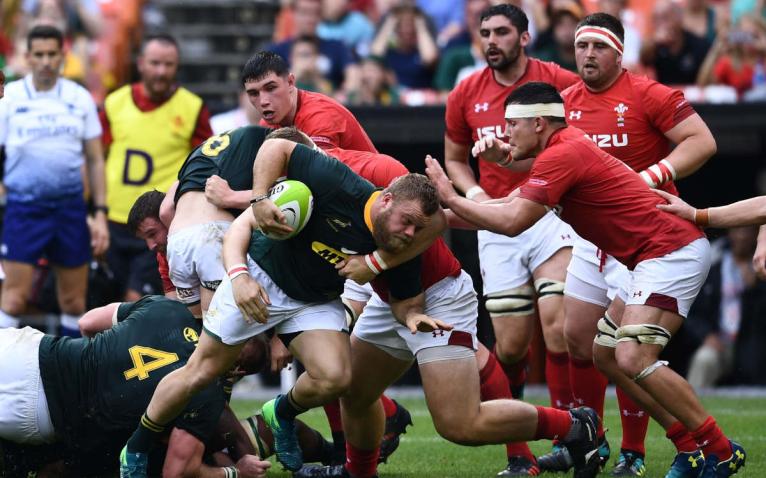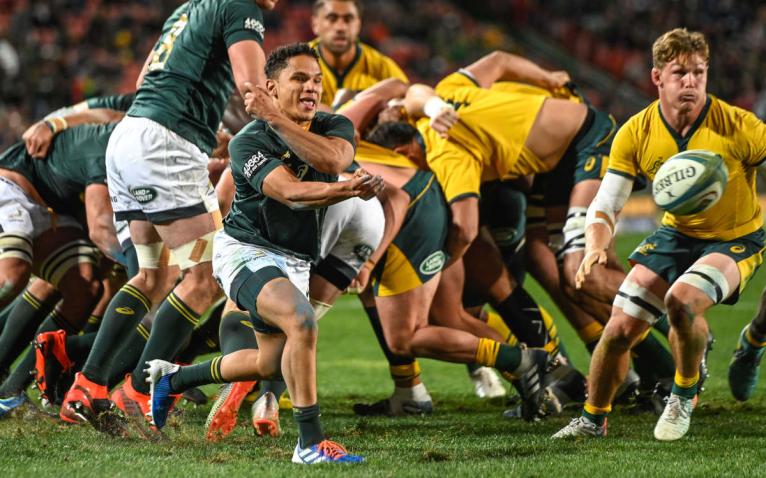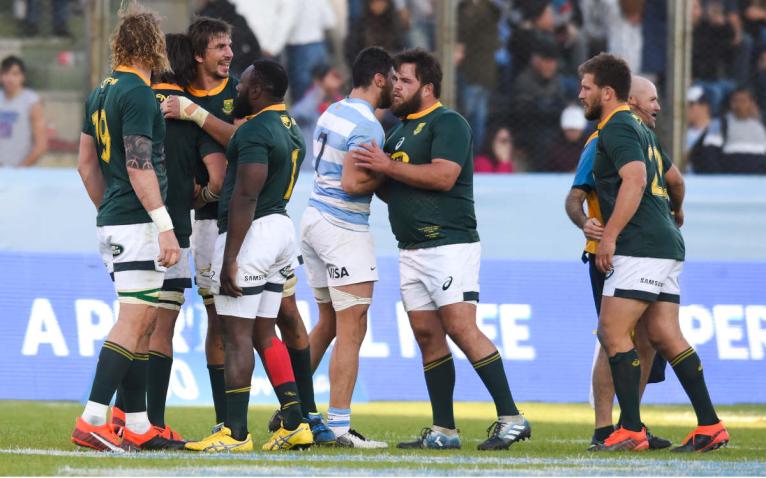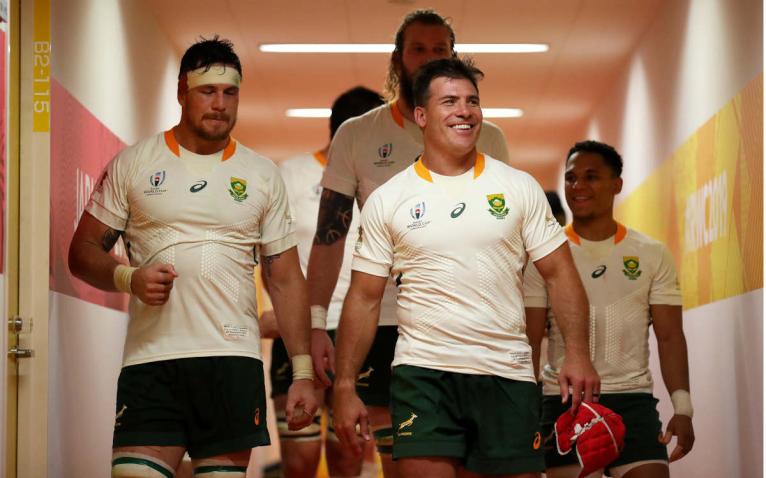Rassie Erasmus and Jacques Nienaber have developed a reputation for thinking outside the box during their six-year stint with the South African national team. Back in the early stages of their tenure, however, high-risk selection policies such as the split-squad strategy and six-two bench were largely untested, and a clutch of skeptical Springbok players were asked to take a leap of faith.
How were these strategies first conceived, and how were they received by the players at the start of the Erasmus-Nienaber era? Schalk Brits and Francois Louw, a couple of senior Boks who retired after the 2019 World Cup, offered RugbyPass+ an insight into this story.
Essentially, it highlights how the coaches earned the trust of the players during a difficult time for South African rugby, and how the group banded together to win the 2019 Rugby Championship as well as the subsequent World Cup in Japan.
The story also sets the scene for the 2023 Test season, where Erasmus and Nienaber will employ the same strategies in the Rugby Championship with the aim of building momentum for the all-important World Cup in France.
“2018 was the turning point for South African rugby,” says Louw, who represented the Boks in 76 Tests between 2010 and 2019.
“You have to remember that we were coming out of a really dark period [where the Boks suffered a series of record losses across the 2016 and 2017 seasons, and slumped to eighth in the world rankings]. We had new leadership in Rassie and his coaches, and they were trying to spark some belief within the team, and externally too.
“Sure, it didn’t look good from a pure results perspective, when we won 50% of our matches in 2018, but it was a helluva important year. We beat the All Blacks in New Zealand, which remains one of the highlights of my career. We lost a few games by narrow margins, but found answers in those defeats that helped us to build and build.”
The tone was set in the very first fortnight of Erasmus’s tenure as head coach, when he selected two different teams for the matches against Wales in Washington DC and England in Johannesburg. Erasmus decided to send a second-string side to the USA, and keep his first-choice combination in South Africa for what he had identified as a landmark series against England.

The Boks went down 22-20 to Wales and Erasmus copped heavy criticism from the media and public. The mood lifted two weeks later, though, after a first-choice side secured a series victory against England. While that result was celebrated, Erasmus insisted that player development was just as important as results ahead of the 2019 World Cup.
Slowly but surely, the Boks started to claw their way back. A victory against the All Blacks in New Zealand sparked a belief within the squad, and across the rugby-mad nation of South Africa. While they finished the 2018 season with seven wins in 14 matches, Erasmus was quietly confident about his team’s chances ahead of the 2019 World Cup.
The 2019 Rugby Championship was identified as an opportunity on a couple of fronts. Erasmus sat the group down and explained why two different squads would feature across the first two weeks of the tournament. He then proceeded to name the starting teams for all three fixtures of the competition.
Rassie laid it all out there – starters, substitutes, and even the players who might come into contention for a specific game in the event of injuries. He explained why he was picking certain players for certain games.
Francois Louw
“Going into 2019, we believed that we had a shot at the title,” says Louw, “The team was in a positive space. Then Rassie, in his typical manner, threw us another curve ball.
“He announced that he was splitting the squads for the Rugby Championship matches against Australia and New Zealand. He decided to send a group of players to New Zealand so that they could acclimatise well ahead of the game – as it’s a very difficult place to tour given the travel time, conditions and the quality of the All Blacks. The rest of us would battle Australia.
“Typically, we’d train hard throughout the week, desperate to impress the coaches ahead of the team announcement for the weekend. Rassie went and flipped that idea on its head. Instead of announcing the team on a Thursday, he announced all three teams for the three Tests of the Rugby Championship – a full two weeks before the tournament started.
“Rassie laid it all out there – starters, substitutes, and even the players who might come into contention for a specific game in the event of injuries. He explained why he was picking certain players for certain games.

“Then he said that if anyone had a problem, we would discuss it as a team. Apart from being transparent, he was trying to show the team how every single player had a role to play, whether they were a starter, a sub, or someone on the outside of the matchday squad. The latter would be tasked with helping with preparation.
“A few guys’ noses were out of joint, as it was something very different to what everyone was used to. But Rassie made his plan clear, and gave everyone a chance to get onboard. This message wasn’t delivered in an aggressive or dictatorial manner, it was just explained in detail.”
Having travelled to the 2015 and 2019 World Cups, Brits is well placed to comment on how different the team environment was in each instance, and what set the class of 2019 apart.
“Ideally you want to secure results and build momentum before a World Cup,” he says. “It doesn’t always go as planned, though.
“I was part of the Bok set-up in 2015. In the first game of the Rugby Championship, we lost narrowly to Australia in Brisbane. Then we went on to lose for the first time to Argentina at home. That kind of set the tone for the rest of that season. We found it very difficult to kick on at the World Cup [where the Boks lost their opening match to Japan].
Nienaber confirmed that he will mix and match his selections for the opening clashes of the 2023 Rugby Championship, and that references to strict “A” and “B” teams won’t do the latter combination justice.
“So in terms of the 2019 season, it was so important to start well. The players’ leadership group bought into the plan at a very early stage. Of course, the onus was on the coach to stick to his word regarding those selections. When he kept his end of the bargain, the onus shifted to the players to perform when given the opportunity, whether they were playing for the A or B team.”
Nienaber recently confirmed that he will mix and match his selections for the opening clashes of the 2023 Rugby Championship, and that references to strict “A” and “B” teams won’t do the latter combination justice.
While the strongest available team is likely to start against the All Blacks in Auckland on 15 July – just as it did in the corresponding Rugby Championship fixture in Wellington four years ago – the Boks are still in a position to field a powerful lineup in the season-opener against the Wallabies in Pretoria.
Back in 2019, the “B” team that faced the Wallabies in Johannesburg included a potent mix of rookies and veterans. Players returning from serious injury – such as lock Lood de Jager – and from the international wilderness – read Frans Steyn and Cobus Reinach – were given a chance to impress. Herschel Jantjies was backed to start on Test debut, and scored two tries. Even without a host of their stars, the Boks claimed a 35-17 bonus-point win.

“The feeling after that win against the Wallabies was: ‘Whoa! What the hell just happened?!’ remembers Louw, who started that game at No 8.
“Suddenly we realised that the extended group, and not just the first-choice XV, was in a great space. We were all fit, hungry and capable of claiming big wins. In short, the Boks could field any combination and still potentially beat any team in the world.
“That was probably where the Bomb Squad was born – because the idea that every player could make an impact, whether they were starting or not, took root.”
The decision to send a team to New Zealand well ahead of the fixture against the All Blacks also paid off. On a typically wet and windy day in Wellington, the Boks fought hard to secure a 16-16 draw. Jantjies came off the bench to score a try in the 79th minute, and Handré Pollard slotted a crucial conversion.
Two weeks later, the Boks romped to a 46-13 bonus-point win against Argentina in Salta, and claimed their first southern-hemisphere title in 10 years.
“We savoured the moment when we beat Argentina,” says Louw. “At the same time, we realised that the hard work was just starting, with the World Cup preparation camps to come. What was entrenched at that moment, of course, was the belief in the coaches and their plan. We went into the preparation camps with a stride in our step.
“We went through that Rugby Championship campaign undefeated, but we leaned on the lessons learned in 2018 to get us through the World Cup, too,” Louw adds.
“It might sound strange, but in 2018, we learned to be bold and play to win rather than not to lose. We learned that it was okay to lose, in the sense that a result shouldn’t stop you from working towards something greater.
The lessons from the Rugby Championship served us well in the World Cup play-offs.
Francois Louw
“That helped us after we didn’t beat New Zealand outright in Wellington. We went to Argentina confident that we could get the win and clinch the Championship title. In the back of our minds, we realised that we hadn’t beaten New Zealand, but we had won the competition.
“We went to the World Cup determined to beat New Zealand in that opening pool game in Yokohama. We pulled out all the stops, and in the end, they scored two quick tries to win the game 23-13. Instead of dwelling on that defeat, we put it behind us quickly. It was a case of ‘Okay, how do we win the tournament from here?’
“The lessons from the Rugby Championship served us well in the World Cup play-offs. We were lucky with injuries, but we did lose Cheslin Kolbe – probably the best player in the world at the time. Usually, there would be a bit of panic in that situation, but instead it was a seamless transition with Sbu Nkosi coming in for the semi-final against Wales. We all backed him to know the plan, given all we had been through months before. There was also a sense of like for like, whenever the coaches made changes.”

Louw played a crucial role for the Bomb Squad over the course of the playoffs, winning a crucial penalty at the breakdown against Wales, and featuring in an emphatic second-half performance against England in the decider.
When the final whistle blew, the non-playing reserves in the stands celebrated as if they had played every minute of that game. There was no bitterness or resentment at having missed out – as they had played their role in preparing their teammates for the challenge of facing England
Brits, who was enlisted as a mentor to the younger players ahead of that global tournament in Japan, explains why it’s so important to keep the non-playing contingent motivated.
“It’s very tricky to keep everyone happy in a big squad. From a player’s perspective, it’s tough to make the sacrifice to leave your family for months on end to prepare for a World Cup, and even tougher when you’re not even playing all the games.
“You really have to buy into what the group is trying to achieve. The leaders and senior guys had a key role to play in Japan, and I’m sure something similar will be on the cards for the build-up to the World Cup in France.”
Erasmus and Nienaber have already earmarked Deon Fourie to fill the Brits-sized gap in the squad. Fourie made his debut against Wales last year at the age of 35. While he may feature in some big games at openside flank over the coming months, and slot in at hooker if the situation demands it, his contributions off the field will be just as important
The coaches may want to look at a few more players in this Rugby Championship, and give guys like Manie Libbok or Damian Willemse more game time at No 10 before the World Cup
Schalk Brits
“Deon Fourie is the perfect player for that role,” says Brits. “He’s coming off an extremely good campaign for the Stormers in the United Rugby Championship, and certainly deserves his spot in the Bok squad. That said, he’s a very experienced player, and someone who could lift the guys who don’t end up playing.
“I wouldn’t be surprised if they followed the same strategy this year,” Brits adds. “The coaches may want to look at a few more players in this Rugby Championship, and give guys like Manie Libbok or Damian Willemse more game time at No 10 before the World Cup. I’m sure they will go into the Rugby Championship campaign with the same drive to win the tournament. Ultimately they will try to build momentum before the World Cup in France.
“It’s a delicate balance,” he admits. “In 2011, the decision to back a lot of the older guys backfired [and the Boks exited the World Cup after losing to Australia in the quarter-finals]. In 2019, there was probably more depth, and in 2023, that depth has been bolstered further.

“Guys like Siya Kolisi and Eben Etzebeth are currently injured, and we know how vital they are for the Boks. But at the same time, it’s good to know that there are other guys with experience who can step in if those players don’t recover.”
Louw believes the Boks are well placed to succeed in the short- and middle-term.
“It’s good to see that they’re trying to get as many players aligned with the plan as possible. That may pay off in the Rugby Championship, but it will definitely pay off more down the line at the World Cup, if they are forced into late changes.
“There are so many uncontrollables in rugby, so you’ve got to make sure that the aspects that are within your control are taken care of.”
So, is history set to repeat itself?
Louw admits that there are similarities between 2019 and 2023. The key difference this season, of course, is the number of teams gunning for the title, with Ireland and France joining perennial World Cup contenders England, New Zealand and South Africa.
“It’s a nice story, to think there’s a parallel between 2019 and 2023. Maybe the build-ups will be similar, but the actual World Cup campaigns will be very different,” he says.
“This group of players will face new challenges. The game is always changing, and the way it’s played and refereed nowadays is not the same as it was back in 2019. Something that was okay four years ago may result in a yellow card this time round.
I’m surprised that more people aren’t worried about New Zealand and Australia. It’s crazy that South Africa aren’t hyped up more, given that they’ve won three World Cups.
Schalk Brits
“The draw is different in 2023, as are the quality of the opponents. The Boks’ road to the final will be a lot tougher, if you think that they may have to go through Scotland, Ireland, New Zealand or France early on.”
Brits believes that the threat from the south shouldn’t be underestimated.
“It’s so close, and I’m surprised that more people aren’t worried about New Zealand and Australia. It’s crazy that South Africa aren’t hyped up more, given that they’ve won three World Cups.
“The mantra of the team in 2019 was ‘Stronger Together’, as we wanted to give hope to our country. I’m sure that the message will be very similar in 2023, but there should also be a drive to win back-to-back World Cup trophies and leave a special legacy.”



Not gonna happen -